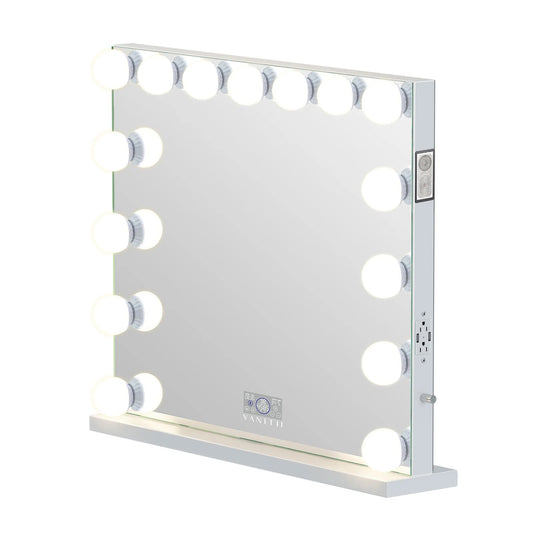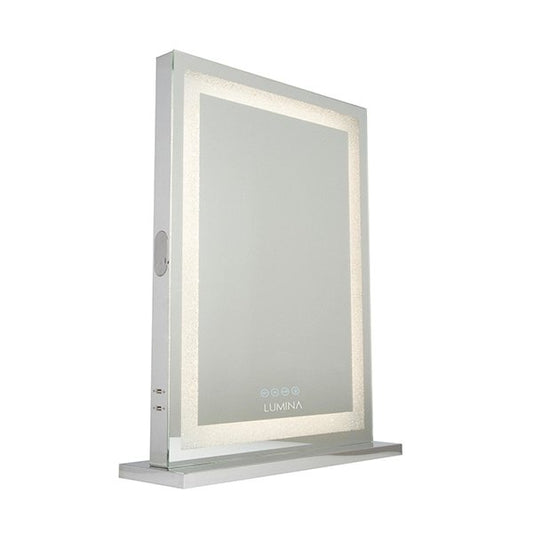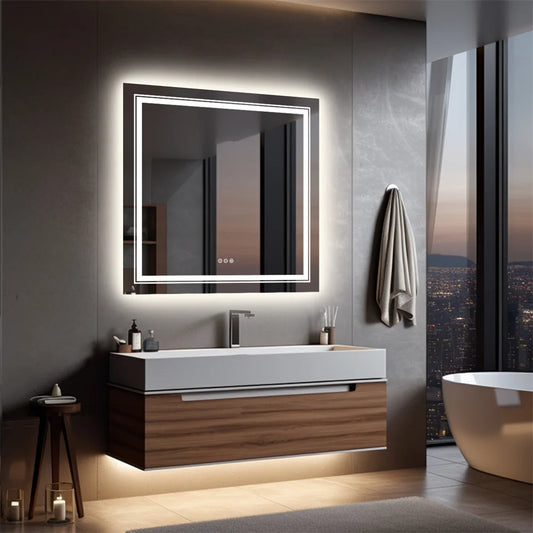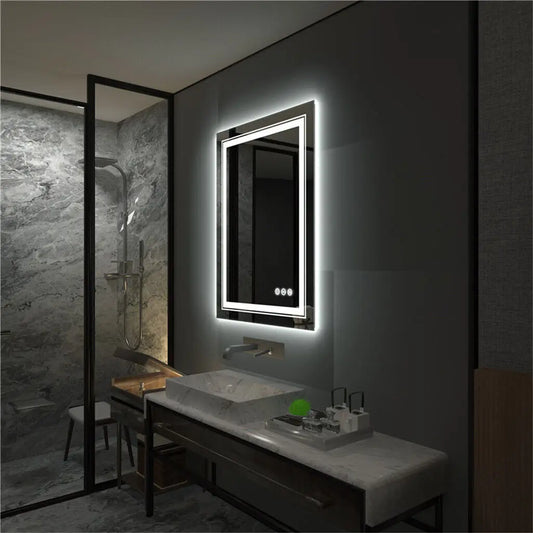Quick Overview of Article
Here is a quick answer to the question Best Materials for Bathrooms Countertops?
Granite, quartz, marble, laminate, and solid surface are the top materials for bathroom countertops. Granite and quartz offer durability and resistance to moisture. Marble provides luxury but requires sealing. Laminate is budget-friendly but less durable. Solid surface materials offer seamless installation and moderate durability.
To dive deeper into the details, carry on reading this post till the end.
Introduction
Choosing the best material for your bathroom countertop can be tough. There are a lot of different factors that you have to consider when doing so, including the cost, durability, water resistance, and so on. (More details on these later.)
Bathroom countertops aren’t easy to replace. It takes a significant investment to buy the countertops and have them installed. For most people, it would be years before they consider replacing them due to the costs involved.
This point just helps us understand the importance of choosing the right material from the get-go.
But don’t worry. In this post, we’ll guide you on the various factors that you should consider when choosing a bathroom countertop material, as well as a list of the most popular options. We will also describe the features and benefits of each material, and compare them for you to easily peruse.
Let’s get started.
Factors to Consider When Choosing a Bathroom Countertop Material
Here is a list of the various factors that you need to consider when choosing a bathroom countertop mirror:
- Cost: It is important to choose a countertop material that falls within your budget range. Some are more expensive than others. While it can seem like a good idea to splurge on fancy granite just for the looks, it’s usually not, especially if you have other remodelling work to do in your bathroom. (Read more: Vanity mirror size guide by Lumina Pro)
- Durability: Durability is also an important factor to consider when choosing the material for your countertop. Think about the type of usage that the countertop is expected to go through, and choose a material accordingly. For light and sparse use, even a moderately durable material will do. On the other hand, for a countertop that is heavily used, you’ll need to buy something that is sturdy and long-lasting.
- Water resistance: Every countertop material has some degree of water resistance. However, if you’re expecting to put the countertop through heavy use, you’ll need a material that can withstand near-constant splashes without losing structural integrity and looks. This is why it is an important factor to consider before making your purchase.
- Stain and scratch resistance: This also depends on the type of use you’re expecting to put the countertop through. For heavy use, it is best to get a material that is stain-resistant and scratch-resistant. This will help to make sure that it doesn’t easily get damaged and lose its aesthetics.
- Maintenance effort/cost: Some countertop materials are easy to maintain, while others are more difficult. Depending on what sort of time and resources you expect to have available in the future, you should choose a countertop material that aligns with your lifestyle. Go for low-maintenance options like quartz or laminate if you prefer minimal upkeep.
- Looks and aesthetics: The looks and aesthetics of the material are also major factors to consider. For many people (including yours truly), looks are perhaps the most important thing to look for in countertops. A luxurious and stylish countertop can uplift the look of the entire bathroom and make it look elegant.
- Installation complexity: Installation complexity matters for DIY enthusiasts. If a particular countertop is not very easy to install, it will have to be handled by a professional. Hiring a professional can be costly, and it can take away the fun of “doing it yourself” for people who care about it.
List of Top Materials + Features, Descriptions
Now let’s dive into the top materials for bathroom countertops along with their features.
1. Granite
We’re going to start off our list with granite, one of the most popular choices when it comes to countertops. There are a lot of reasons why people choose this material.
One of the main things that stands out with granite is that it is natural. It is not engineered or synthetically manufactured, which is a cause of concern for many people.
Granite is a tough material, and it can withstand rough use without breaking or getting damaged. It can resist scratches, heat, and common bathroom stains. When installed as your bathroom countertop, you don’t have to worry about it being spoiled by makeup spills, hot water splashes, and the occasional scratch from a sharp appliance or accessory.
Here is a list of the key features of granite:
- It is 100% natural and is sourced from quarries located in Italy, China, Brazil, and India.
- Natural granite comes in unique patterns, giving each user a one-of-a-kind aesthetic.
- Granite is relatively low-maintenance, but since it’s a porous natural stone, it should be sealed periodically to prevent staining and moisture absorption.
- Granite is heavy and likewise tricky to install. Buying granite countertops and installing them is an expensive endeavor, but for many, it is worth it.
2. Quartz
Moving on, we have Quartz.
In terms of durability, Quartz is perhaps one of the best countertop materials out there. It is engineered using a mixture of crushed quartz, polymer resin, and pigments (for color). It is non-porous and low-maintenance.
Unlike granite, you don’t have to periodically treat Quartz with sealant. Due to its natural properties, it is resistant to water, stains, and scratches.
Although Quartz can withstand a moderate level of heat, it doesn’t have the same level of resistance as granite. So, be a bit careful about putting something scalding on the surface, as it can cause discoloration.
Another downside of Quartz is that, due to its aesthetics and durability, it is quite expensive. People who have a bigger budget, however, consider it a good deal due to its low maintenance requirements later on.
Here is a list of the main features of this material for easy perusal:
- Engineered using crushed quartz and polymer resin. The engineered construction makes the material compact and dense.
- Resistant to scratches, stains, and water.
- Low-maintenance. Does not require constant treatments for longevity.
- Highly aesthetic and stylish. Quartz is available in a number of different hues and colors, achieved by the addition of pigments during the manufacturing process.
- Quartz countertops are quite easy to install. It is possible for enthusiasts to make a DIY job out of them, even though it’s generally more advisable to hire a professional.
3. Marble
Marble is the “showman” when it comes to countertop materials. It is durable and heat-resistant, but it requires a significant amount of upkeep for optimal appearance and longevity.
Since marble is porous, it can be adversely affected by water. If it is not properly maintained, the water can seep in and make stains and etch marks.
However, with all these potential downsides and considerations, marble is one of the most premium choices for bathroom countertops for one simple reason: the aesthetics.
There isn’t a material that can beat marble in its luxurious appearance and unique designs. Marble is naturally sourced and comes with vein patterns that are unique to each piece. It can uplift the look of any bathroom.
Here is a list of the main features of marble:
- Marble is heat-resistant. It won’t get damaged if you place hot items on it, nor will it wear away under hot water splashes.
- It is durable and sturdy. Marble won’t crack or break under impact, and you can expect it to last a long time.
- Marble is not scratch-resistant. While it won’t scratch easily, you have to be careful placing sharp items on it or rubbing anything rough against it.
- Marble is porous, and it needs to be treated on a regular basis to ensure longevity.
- One of the best things about this material is its look. As a natural stone, every marble design is unique, and there are no two slabs in the world that are identical.
4. Laminate
With laminate, we step into the territory of low-end, affordable countertops. This material is a combination of paper and plastic, bonded together with resin. Since it is not a natural stone or a product of the same, it doesn’t have a high degree of heat resistance.
Laminate is designed to be water-resistant. It is safe to be used in most bathrooms. However, if it starts breaking and water starts seeping in, it can cause damage.
This material is ideal for homeowners who don’t have a lot of money to spend on countertops. It is affordable and it provides the basic functionality. One possible use of laminate countertops is as a temporary arrangement until a more expensive material is procured. As far as aesthetics go, laminate can usually be purchased in different designs and patterns. It can also imitate natural stone like granite or marble.
Here is a list of the key features of laminate:
- Laminate is very affordable and inexpensive. It is an ideal solution for people with a tight budget.
- It is very easy to install. This makes it a great option for DIY enthusiasts.
- Laminate is low-maintenance and can be easily cleaned.
- It is resistant to scratches and stains, and can last for a long time if properly maintained.
- Laminate countertops are available in various designs and patterns, allowing homeowners to get the option that suits them the best.
5. Solid Surface
Solid surface is another decent countertop material that you can consider buying if you don’t have the budget for natural stone. Solid surface is not as expensive as marble or granite, but it is also not as cheap as laminate. It falls somewhere in the middle.
This material is made using a blend of acrylic and polyester resin. The resin is combined with filler and pigments. The end product is hard, durable, and similar in appearance to natural stone.
Like laminate, solid surface is easy to install. It is lightweight and is great for DIY projects. On top of all this, solid surface is also non-porous, which makes it water resistant.
Here is a summary of its key features:
- Solid surface is hardy and durable.
- It is water-resistant thanks to its non-porous design.
- Although moderately resistant to heat and scratches, it is best not to use sharp and hot items around it.
- Solid surface counters are very easy to work with due to their lightweight construction.
- Since these countertops are engineered, they are available in a number of different colors and patterns that homeowners can choose from. They can complement the aesthetics of the bathroom and are overall considered a stylish choice to pick.
Comparison Table of All Materials: Pros and Cons
Here is a table that shows the various materials along with their traits and properties. The purpose of this table is to help you understand the differences between them.
|
Material |
Durability |
Water Resistance |
Stain Resistance |
Maintenance |
Cost |
Looks |
Ease of Installation |
|
Quartz |
High |
Excellent |
Excellent |
Low |
$$$ |
Modern, consistent, upscale |
Difficult (requires pro) |
|
Granite |
High |
Good (sealed) |
Good (sealed) |
Medium |
$$$ |
Natural, unique, high-end |
Difficult (requires pro) |
|
Marble |
Medium |
Poor (porous) |
Low |
High |
$$$$ |
Luxurious, elegant, classic |
Difficult (requires pro) |
|
Laminate |
Low-Med |
Fair |
Fair |
Low |
$ |
Varied, can mimic stone |
Easy (DIY-friendly) |
|
Solid Surface |
Medium |
Excellent |
Good |
Low |
$$ |
Seamless, modern, clean |
Moderate (can be DIY with tools) |
Recommended Material for Different Buyers and Users
Here is our recommendation on which material should be chosen by different types of buyers and users:
Homeowners
- Recommended Materials: Quartz, Granite
- Why: Quartz offers durability and low maintenance, while granite provides natural beauty and strong resale value.
Interior Designers
- Recommended Materials: Marble, Quartz
- Why: Marble delivers unmatched luxury and natural veining, while quartz gives consistent aesthetics and versatile color options with less upkeep.
Contractors
- Recommended Materials: Quartz, Solid Surface
- Why: Quartz is reliable and popular among clients; solid surface is easier to fabricate and offers seamless installation.
DIY Enthusiasts
- Recommended Materials: Laminate, Solid Surface
- Why: Laminate is lightweight and easy to cut, while solid surface can be installed by skilled DIYers with basic tools.
Real Estate Agents
- Recommended Materials: Quartz, Granite
- Why: Both materials appeal to buyers, boost perceived property value, and are associated with quality bathrooms.
Engineered Wood: The Underrated Bathroom Vanity Material
Here on Lumina Pro, we offer a range of different vanity tables and units that you can place in your bedroom, vanity room, and even your bathroom. Most of our products are constructed with an engineered wood tabletop. Engineered wood is a good countertop as it provides aesthetics and durability, and is easy to install. While it is prone to scratches, burns, and water damage, it can last a long time if used correctly.
You can check out our vanity table collection on this link.
FAQs
What is the most durable countertop for a bathroom?
Quartz is usually considered the most durable countertop material for bathrooms. Due to the engineered construction, it is quite strong and lacks the brittleness of some natural materials.
What is better for bathroom, quartz or granite?
Both granite and quartz are good materials for countertops. Granite can be more aesthetic and visually appealing than quartz, as it is a natural stone. However, it requires more upkeep. It has to be treated with a sealant every now and then.
Quartz, on the other hand, is more durable and low-maintenance. The final choice between them depends on your personal needs and preferences.
Is quartz cheaper than granite?
Quartz is generally considered cheaper than granite. However, in some locations, due to the import costs, they may end up being similarly priced. The best way to determine whether Quartz is cheaper than granite is to look it up at your local stores.
What is the most expensive countertop?
Marble is considered the most expensive countertop. It has a luxurious and unique look and is highly coveted for its aesthetics.
Conclusion
There are many different materials that you can pick from for your bathroom countertops. Quartz, granite, marble, laminate, and solid surface all have their pros and cons. We’ve listed all of them in detail in the post above for your reference.
In most cases, the final choice comes down to either affordability or personal preference. Many people can go with the choice that falls within their budget. People who don’t have a financial constraint typically go with whatever looks best.
The purpose of our guide above was to help educate buyers so that they can make a decision while keeping in mind the other important factors like durability, heat resistance, scratch resistance, etc.
We hope you enjoyed reading! Check out our other blogs to learn more tips about bathroom remodelling.





